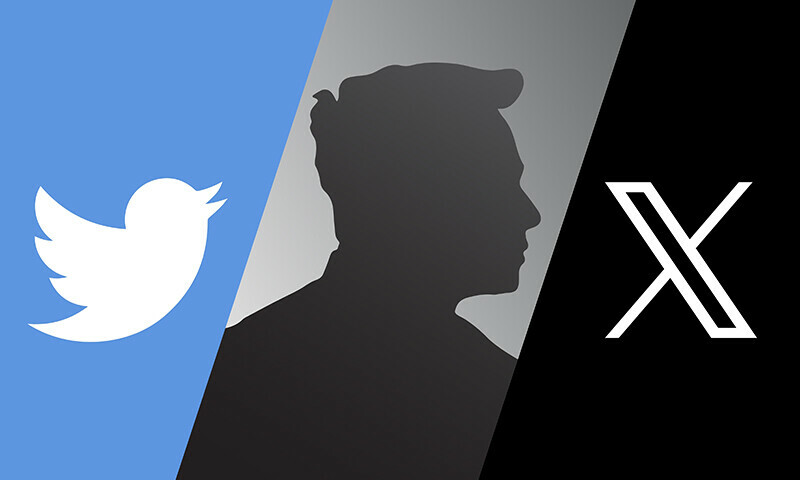Is Elon Musk committing ‘brandicide’?
Julian Saunders

When I first heard that Elon Musk had decided to drop Twitter’s iconic bird logo and replace it with an X, I thought it was a publicity stunt.
Perhaps by threatening to commit ‘brandicide’ Musk hoped he would trigger an outpouring of love for the departing brand, and that tweeters wouldn’t defect to Threads (Meta’s new clone of Twitter). If that was the idea, it didn’t work. Twitter is famous but not much loved. After an hour of dooms-scrolling on Twitter, you feel dispirited by the impotent anger of heavy tweeters, many of whom appear to be attention-seeking middle-aged white men. Twitter is not a happy place – and has become even more grim after the “free speech absolutist” Elon Musk took over.
But on second thought, there is a logic to it: Musk wants to turn his business into an ‘everything app’ a bit like WeChat – a place to browse, buy, link up with friends, message and much more besides. A lifestyle app. This would be a dramatic change of meaning for Twitter which is currently perceived as a public square for news, debate and argument. Most definitely not a lifestyle app in other words – you would never browse this year’s fashions or buy jewellery on Twitter.
Radically changing a brand’s meaning requires an action to challenge our existing perceptions, to get us to stop and think again about what the brand stands for. This is very difficult to achieve with a famous and well-understood brand. The most drastic way is to change the name. Brand theorists call this “a symbol of re-evaluation.”
That’s the logic. But will it work? I would not put my money into it. It would require a number of things to be in place, most of which are not.
• Motivated Talent – Musk has sacked a lot of his staff and what remains is not a happy ship.
• Inspirational leadership – Musk has shown himself to be a great leader of an EV company but a cack-handed one of a tech brand.
• Money – Musk has plenty but he has less that Meta. Twitter is losing money so he will have to fund it from Tesla. Tesla investors have always hated Musk’s investment in Twitter thinking it to be a distraction from the core business of EVs. They are right and will kick up a fuss.
• Time – Musk is very impatient and his competitors play long.
• Weak or complacent competition – You may not like Mark Zuckerberg but he is always alert to opportunity and steals competitor’s innovations for fun (see Threads).
It may after all turn out to be a publicity stunt – but a threadbare one.
Julian Saunders is a former ad agency CEO and Googler who has worked for the UK government. julians@joinedupcompany.com

When I first heard that Elon Musk had decided to drop Twitter’s iconic bird logo and replace it with an X, I thought it was a publicity stunt.
Perhaps by threatening to commit ‘brandicide’ Musk hoped he would trigger an outpouring of love for the departing brand, and that tweeters wouldn’t defect to Threads (Meta’s new clone of Twitter). If that was the idea, it didn’t work. Twitter is famous but not much loved. After an hour of dooms-scrolling on Twitter, you feel dispirited by the impotent anger of heavy tweeters, many of whom appear to be attention-seeking middle-aged white men. Twitter is not a happy place – and has become even more grim after the “free speech absolutist” Elon Musk took over.
But on second thought, there is a logic to it: Musk wants to turn his business into an ‘everything app’ a bit like WeChat – a place to browse, buy, link up with friends, message and much more besides. A lifestyle app. This would be a dramatic change of meaning for Twitter which is currently perceived as a public square for news, debate and argument. Most definitely not a lifestyle app in other words – you would never browse this year’s fashions or buy jewellery on Twitter.
Radically changing a brand’s meaning requires an action to challenge our existing perceptions, to get us to stop and think again about what the brand stands for. This is very difficult to achieve with a famous and well-understood brand. The most drastic way is to change the name. Brand theorists call this “a symbol of re-evaluation.”
That’s the logic. But will it work? I would not put my money into it. It would require a number of things to be in place, most of which are not.
• Motivated Talent – Musk has sacked a lot of his staff and what remains is not a happy ship.
• Inspirational leadership – Musk has shown himself to be a great leader of an EV company but a cack-handed one of a tech brand.
• Money – Musk has plenty but he has less that Meta. Twitter is losing money so he will have to fund it from Tesla. Tesla investors have always hated Musk’s investment in Twitter thinking it to be a distraction from the core business of EVs. They are right and will kick up a fuss.
• Time – Musk is very impatient and his competitors play long.
• Weak or complacent competition – You may not like Mark Zuckerberg but he is always alert to opportunity and steals competitor’s innovations for fun (see Threads).
It may after all turn out to be a publicity stunt – but a threadbare one.
Julian Saunders is a former ad agency CEO and Googler who has worked for the UK government. julians@joinedupcompany.com
No comments:
Post a Comment